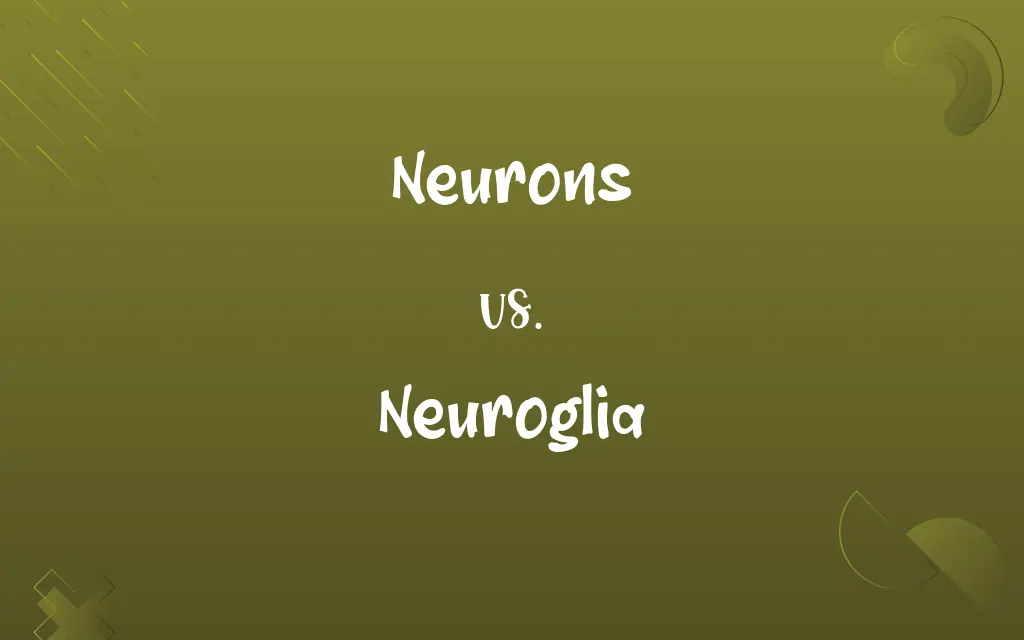Neurons vs. Neuroglia: Know the Difference

By Shumaila Saeed || Updated on December 25, 2023
Neurons are the primary cells of the nervous system, transmitting signals, while neuroglia support, protect, and nourish neurons.

Key Differences
Neurons are specialized cells in the nervous system responsible for transmitting electrical and chemical signals, fundamental for brain and nerve function. Neuroglia, in contrast, play a supporting role, aiding in the maintenance, protection, and support of neurons.
Shumaila Saeed
Dec 10, 2023
Neurons have a unique structure with dendrites, a cell body, and an axon to facilitate signal transmission. Neuroglia do not have such specialized structures, as their primary role is to provide support and insulation for neurons.
Shumaila Saeed
Dec 10, 2023
There are various types of neurons, including sensory, motor, and interneurons, each with specific functions. Neuroglia also come in different types, such as astrocytes, oligodendrocytes, and microglia, each serving different supporting roles.
Shumaila Saeed
Dec 10, 2023
Neurons generally do not replicate or regenerate after being fully developed, making them more vulnerable to damage. Neuroglia can proliferate and repair themselves, thereby playing a crucial role in the healing and maintenance of the nervous system.
Shumaila Saeed
Dec 10, 2023
Neurons interact directly with other neurons or muscle cells, transmitting impulses for bodily functions. Neuroglia, while they do not transmit impulses, interact with neurons to provide metabolic support, waste removal, and structural stability.
Shumaila Saeed
Dec 10, 2023
ADVERTISEMENT
Comparison Chart
Primary Function
Transmit electrical and chemical signals.
Support, protect, and nourish neurons.
Shumaila Saeed
Dec 10, 2023
Structure
Unique with dendrites, cell body, and axon.
Lack specialized structures for signal transmission.
Shumaila Saeed
Dec 10, 2023
Types and Diversity
Various types like sensory, motor, interneurons.
Various types like astrocytes, oligodendrocytes.
Shumaila Saeed
Dec 10, 2023
Reproduction and Repair
Limited replication and regeneration.
Can proliferate and repair themselves.
Shumaila Saeed
Dec 10, 2023
Cell Interaction
Interact with other neurons or muscle cells.
Provide metabolic support and structural stability.
Shumaila Saeed
Dec 10, 2023
ADVERTISEMENT
Neurons and Neuroglia Definitions
Neurons
Signal Transmitters
Neurons transmit signals, enabling us to think and react.
Shumaila Saeed
Dec 03, 2023
Neuroglia
Supporting Cells
Neuroglia provide critical support to neurons in the brain.
Shumaila Saeed
Dec 03, 2023
Neuroglia
Protective Cells
Neuroglia protect neurons from damage and infection.
Shumaila Saeed
Dec 03, 2023
Neurons
Electrical Impulse Carriers
Neurons carry electrical impulses throughout the body.
Shumaila Saeed
Dec 03, 2023
ADVERTISEMENT
Neuroglia
Nourishing Cells
Neuroglia nourish neurons, ensuring their health and functionality.
Shumaila Saeed
Dec 03, 2023
Neurons
Communication Cells
Neurons communicate with each other through synapses.
Shumaila Saeed
Dec 03, 2023
Neuroglia
Brain Maintenance Cells
Neuroglia are essential for maintaining the brain's environment.
Shumaila Saeed
Dec 03, 2023
Neurons
Brain Cells
Neurons in the brain are essential for cognitive functions.
Shumaila Saeed
Dec 03, 2023
Neuroglia
Insulating Cells
Neuroglia insulate neurons, enhancing signal transmission.
Shumaila Saeed
Dec 03, 2023
Neurons
Any of the impulse-conducting cells that constitute the brain, spinal column, and nerves in vertebrates, consisting of a nucleated cell body with one or more dendrites and a single axon.
Shumaila Saeed
Dec 01, 2023
Neuroglia
The supportive tissue of the nervous system, including the network of branched cells in the central nervous system (astrocytes, microglia, and oligodendrocytes) and the supporting cells of the peripheral nervous system (Schwann cells and satellite cells). Also called glia.
Shumaila Saeed
Dec 01, 2023
Neurons
A similar impulse-conducting cell in invertebrates.In both senses also callednerve cell.
Shumaila Saeed
Dec 01, 2023
Neuroglia
The delicate connective tissue framework which supports the nervous matter and blood vessels of the brain and spinal cord; called also Kölliker's reticulum. It is composed of cells which are not neurons. Once thought to serve merely a supporting funciton, they are now believed to have important metablolic functions. Among them are the astrocytes, ependymal cells, oligodendroglia cells, and microglia cells.
Shumaila Saeed
Dec 01, 2023
Neuroglia
Sustentacular tissue that surrounds and supports neurons in the central nervous system; glial and neural cells together compose the tissue of the central nervous system
Shumaila Saeed
Dec 01, 2023
Repeatedly Asked Queries
Do neuroglia transmit signals?
No, neuroglia do not transmit signals like neurons.
Shumaila Saeed
Dec 10, 2023
What is the role of neuroglia?
Neuroglia support, protect, and nourish neurons.
Shumaila Saeed
Dec 10, 2023
What are neurons?
Neurons are the primary cells of the nervous system, responsible for transmitting signals.
Shumaila Saeed
Dec 10, 2023
What are the parts of a neuron?
A neuron consists of dendrites, a cell body, and an axon.
Shumaila Saeed
Dec 10, 2023
Can neurons regenerate?
Neurons have limited ability to regenerate or replicate.
Shumaila Saeed
Dec 10, 2023
How many types of neurons are there?
There are several types, including sensory, motor, and interneurons.
Shumaila Saeed
Dec 10, 2023
Are neurons found throughout the body?
Yes, neurons are found in the brain, spinal cord, and peripheral nerves.
Shumaila Saeed
Dec 10, 2023
How do neurons communicate?
Neurons communicate through electrical and chemical signals across synapses.
Shumaila Saeed
Dec 10, 2023
Can neuroglia repair brain damage?
Neuroglia play a role in repairing and maintaining the nervous system, but they cannot fully repair all types of brain damage.
Shumaila Saeed
Dec 10, 2023
How do neuroglia support neurons?
Neuroglia provide structural support, nourishment, and protection to neurons.
Shumaila Saeed
Dec 10, 2023
Can neuroglia become neurons?
No, neuroglia and neurons are distinct cell types with different functions.
Shumaila Saeed
Dec 10, 2023
Can neurons function without neuroglia?
Neurons rely on neuroglia for support and survival, so they cannot function optimally without them.
Shumaila Saeed
Dec 10, 2023
Are neuroglia involved in brain diseases?
Neuroglia can be involved in various brain diseases, either as part of the disease process or in the response to disease.
Shumaila Saeed
Dec 10, 2023
Do neuroglia form synapses?
No, synapses are specific to neuronal connections.
Shumaila Saeed
Dec 10, 2023
Do neurons store information?
Neurons are involved in processing and transmitting information, but they don't store it in the way memory storage is typically understood.
Shumaila Saeed
Dec 10, 2023
Are neurons bigger than neuroglia?
Neurons are generally larger and more complex in structure than neuroglia.
Shumaila Saeed
Dec 10, 2023
How do neuroglia affect brain health?
Neuroglia are crucial for maintaining the homeostasis and overall health of the brain.
Shumaila Saeed
Dec 10, 2023
What is the lifespan of neurons?
Neurons can live as long as the organism, often a lifetime.
Shumaila Saeed
Dec 10, 2023
Do all neurons transmit the same type of signal?
No, neurons can transmit different types of signals depending on their function.
Shumaila Saeed
Dec 10, 2023
Share this page
Link for your blog / website
HTML
Link to share via messenger
About Author
Written by
Shumaila SaeedShumaila Saeed, an expert content creator with 6 years of experience, specializes in distilling complex topics into easily digestible comparisons, shining a light on the nuances that both inform and educate readers with clarity and accuracy.









































































